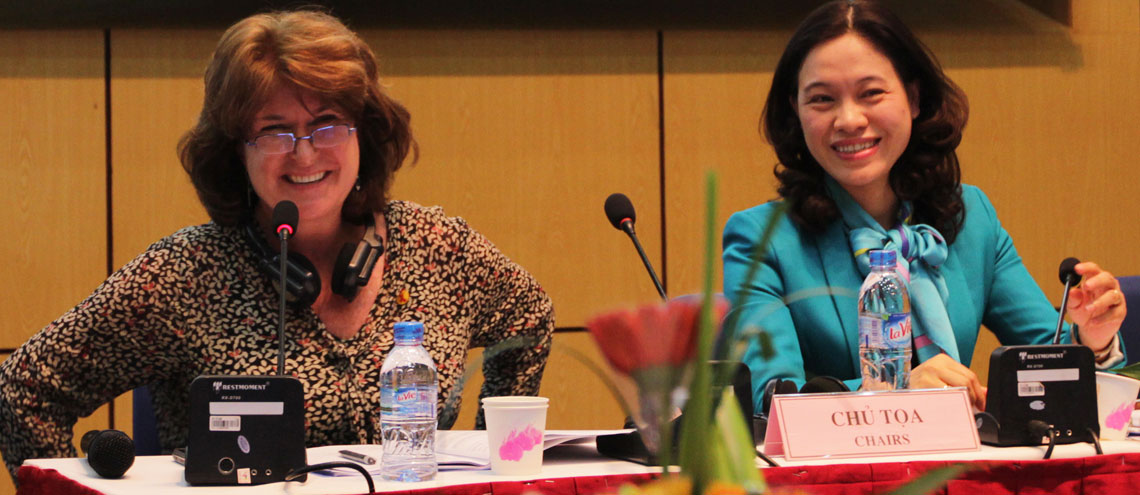Vietnamese Youth Better Prepared Against HIV
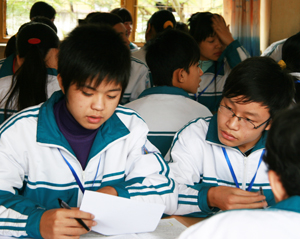 Pham Xuan Tung (on the left in photo) talks eagerly and takes notes for his group during a biology lesson on HIV transmission and the virus’ replication in blood cells. This new type of highly interactive class is something Tung, a student at Hoang Quoc Viet upper secondary school in Dong Trieu District, Quang Ninh Province, clearly enjoys.
Pham Xuan Tung (on the left in photo) talks eagerly and takes notes for his group during a biology lesson on HIV transmission and the virus’ replication in blood cells. This new type of highly interactive class is something Tung, a student at Hoang Quoc Viet upper secondary school in Dong Trieu District, Quang Ninh Province, clearly enjoys.
The class is based on a new integrated reproductive health and HIV prevention curriculum for secondary school students that is being developed and piloted by the Ministry of Education and Training (MOET), with support from the United Nations (UN) and Save the Children in Viet Nam. Many students of Tung’s age in Quang Ninh Province, Quang Tri Province and Ho Chi Minh City are participating in the pilot teaching of this new curriculum.
A comprehensive national HIV prevention curriculum
The new curriculum is not just another set of HIV prevention lessons added on to the different existing pilot HIV curricula that have been introduced in Viet Nam since 1995 through different projects supported by UN agencies. Rather, the new curriculum integrates reproductive health and HIV into core lessons and extra-curricular activities for secondary schools and is meant for use nationwide. It also includes special training for parents so that they can better discuss sometimes sensitive HIV and reproductive health issues with their children.
In order to achieve this unified HIV curriculum, three UN agencies – UNICEF , UNFPA and UNESCO – have been working together since 2008 as part of the Joint UN Team on HIV/AIDS under the framework of UN reform , together with Save the Children, to support the development and institutionalization of the curriculum.
“This is a unique experience with the UN I’ve never seen elsewhere,” said Ms. Lisa Sherburne, an HIV specialist with Save the Children. “We can continue with the curriculum development because of this joint effort [by the UN agencies]. It allows more resources, more cohesive actions and more powerful voice to the Viet Nam education sector,” she added. “I think the UN in other countries should have the same model.”
Trying to build upon what have been achieved in previous projects, MOET, with assistance from Save the Children, conducted a stocktaking review of all existing curricula in Viet Nam including the healthy living and life skills program for lower secondary schools supported by UNICEF, the reproductive health and HIV prevention program for upper secondary schools supported by UNFPA, and the pre-service training program for teachers on HIV supported by UNESCO.
The UN advised throughout the process by sharing its insights from previous efforts and helping with a global literature review, which examined lessons learned and good practices in curriculum development. The two analyses have helped strengthen the pilot curriculum, ensuring the consistency and comprehensiveness of both classroom curriculum and extra-curricular activities.
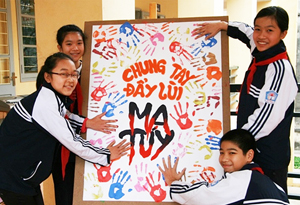 This combination of local lessons and global good practices have resulted in a comprehensive curriculum where reproductive health is strongly linked to HIV prevention; a shift is made towards a learning environment that empowers young people to think and make choices for themselves in reproductive health and HIV matters; and HIV education reaches beyond the school environment through special training for the parents of students. These changes towards more dynamic teacher-student and parent-child relationships facilitate better guidance for youth on reproductive health and on how to protect themselves from HIV. Ultimately this approach helps improve communications modes on HIV nationwide.
This combination of local lessons and global good practices have resulted in a comprehensive curriculum where reproductive health is strongly linked to HIV prevention; a shift is made towards a learning environment that empowers young people to think and make choices for themselves in reproductive health and HIV matters; and HIV education reaches beyond the school environment through special training for the parents of students. These changes towards more dynamic teacher-student and parent-child relationships facilitate better guidance for youth on reproductive health and on how to protect themselves from HIV. Ultimately this approach helps improve communications modes on HIV nationwide.
These changes are all aimed at integrating HIV prevention into the next national curriculum framework and new textbooks to be developed by the Ministry and approved by the National Assembly in 2015.
However, many challenges still remain on the road to this big milestone. The ministry needs not only strong political leadership but also greater capacity for planning and coordination, sufficient resources, teachers with better capacity, and effective intra-ministry and multi-sectoral coordination to turn their wishes into reality.
A concerted response to HIV by the education sector
Coordination is the other key area in the education sector response where support from the UN is helping make a difference.
“Our biggest challenge is how to facilitate the close collaboration among departments in the ministry and among ministries related to the education sector response to HIV,” expressed Mr. La Quy Don, Vice Director of MOET Department of Student Affairs, the focal department on health education (including HIV) within the ministry.
This is one reason MOET leaders are so motivated to establish an inter-departmental coordination committee on HIV, for which they have requested support from the UN.
In December 2009, an MOET delegation headed by Vice Minister Nguyen Vinh Hien visited Cambodia with support from the UN to learn from their experiences in coordinating the national education sector response to HIV via an inter-departmental coordination committee.
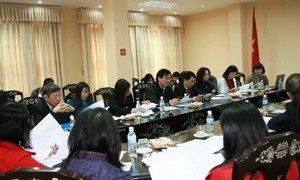 The study visit provided the delegation with many in-sights, and work to establish a similar committee for MOET has gained momentum. High level discussions with participation of MOET leaders, UN Heads of Agencies and representatives of related departments within the ministry were held to determine the committee’s charter, organizational issues and tentative work plan for 2010.
The study visit provided the delegation with many in-sights, and work to establish a similar committee for MOET has gained momentum. High level discussions with participation of MOET leaders, UN Heads of Agencies and representatives of related departments within the ministry were held to determine the committee’s charter, organizational issues and tentative work plan for 2010.
“It’s very heartening to see the committee taking shape,” said Vice Minister Nguyen Vinh Hien. “This is the clear impact of the UN working as one with our ministry. Greater UN coherence has motivated us to strengthen out internal coordination. This committee will help us avoid duplication, address potential gaps and have a better overview of the sector response to HIV. I can see the One UN is better meeting the demands of the education sector,” he added.
Looking to the future
In addition to helping strengthen institutional arrangement, the UN is also helping MOET to access resources from the Global Fund on AIDS, Tuberculosis and Malaria Prevention. Funds from the upcoming grant round will ensure enough resources are in place for an effective and sustainable education sector-wide response to HIV in Viet Nam.
This includes expanding the use of the new curriculum in secondary education, addressing HIV at other levels of the education system – especially fighting stigma and discrimination in kindergartens and primary classrooms, formulate a strategic plan on HIV and Sexuality for 2011-2015, and ensuring pre-service teacher training and mainstreaming of HIV in the next national curriculum framework.
Strong commitment and leadership have been shown by MOET, but additional support is needed to realize the vision of a sector-wide response. This will again be a joint effort in which the UN – particularly UNICEF, UNFPA, UNESCO and UNAIDS – will work with other development partners such as Save the Children.
“We are committed to providing joint support for policy-making, enhanced coordination and implementation of several key aspects of the education sector’s response to HIV,” said Mr. Eamonn Murphy, UNAIDS Viet Nam Country Director.
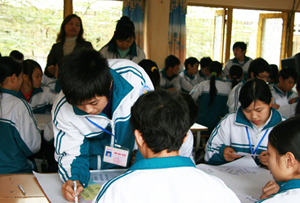 The ultimate goal of this support is to ensure that all Vietnamese young people, not just Tung and his peers in Hoang Quoc Viet school, can best protect themselves from HIV.
The ultimate goal of this support is to ensure that all Vietnamese young people, not just Tung and his peers in Hoang Quoc Viet school, can best protect themselves from HIV.
“I have seen a positive change in the participation of students in my class. The new teaching and learning method allows room for every student to speak up, and they are much more responsive,” said Tung’s teacher Truong Thi Hoa (far behind in photo). “I hope this learning method and the training for teachers and student’s parents will help young people willing to talk openly about HIV and related issues and thus better protect themselves.”


